Comparing the “fact based” rollout of the JD Vance and Kamala Harris candidacies
NPR journalists were tasked last week with introducing readers to new candidates Kamala Harris (Democrat, President) and J.D. Vance (Republican, Vice President). As such, we got a good glimpse of how NPR and other similar media outlets will shape this year’s post-mulligan Presidential campaign.
One of the striking things about the NPR brand is how heavily the media organization distinguishes itself as a practitioner of “fact-based journalism.” This term circulates nationally and also, apart from the national field office, at local affiliate stations across the U.S.
Here is an example of the claim from one of my two local NPR affiliates, WEKU. (As an average university town, there is likely an unmet demand for a 3rd outlet to daily project the horny political “fact-based” grunts of Michael Barbaro across the Bluegrass airwaves. But I digress.)

Whether used in seasonal fundraising drives or as part of regular NPR programming, the phrase is an unconscious expression of lax writing and a need for NPR to hire more attentive copy-editors. Fact-based journalism is in fact a professional “pleonasm — a redundancy in linguistic expression, like ‘black darkness,’” write Philip Napoli and Asa Royal in a recent piece for Harvard’s Nieman Journalism Lab. “All journalism is fact-based. If it’s not, then it’s not journalism.” [Emphasis mine.]
As Napoli and Royal note, this particular pleonasm gained credible circulation in the mid 2010s, mainly as a reactionary response to the Trump-fueled rise of the term “fake news.” Like most terminology (Build Back Better, anyone?), Democrats mainly only seem capable these days of producing lesser bland copies of original Republican thought. How else to explain how we ended up with our current gerentocratic white male president who possesses a brain that is certifiably more cooked than his orange-skinned Republican predecessor?
Fact-based journalism resides within this uninspired list of reactionary #resistance brand-lines:
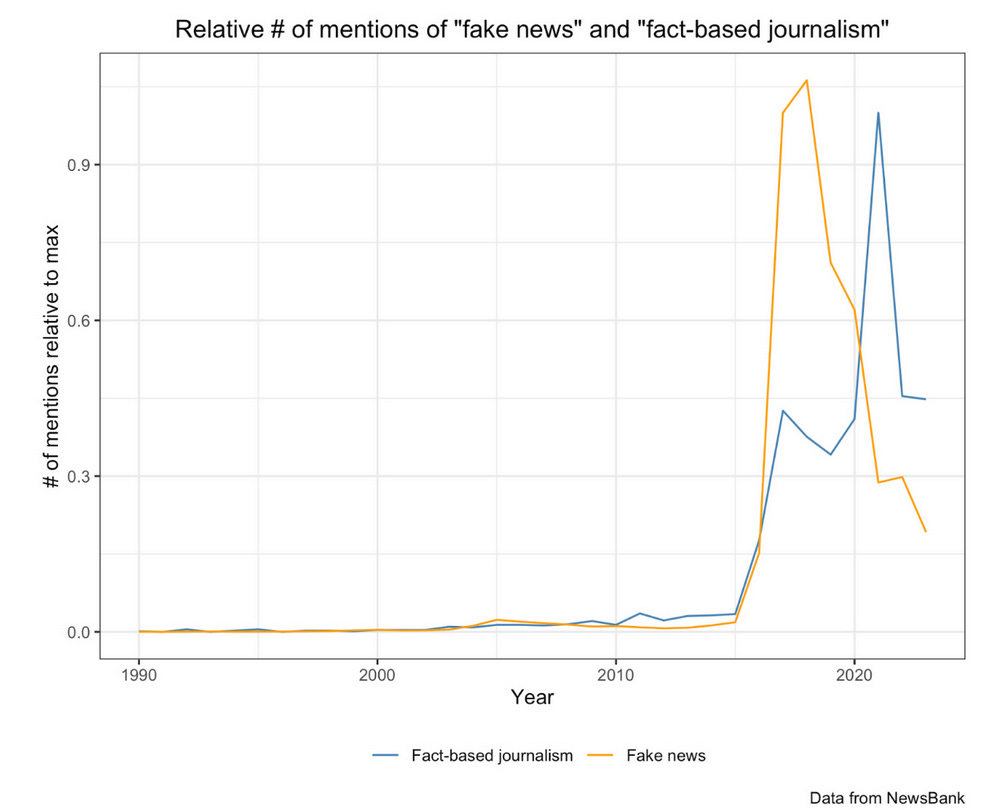
The Nieman Lab authors do not state it outright, but it is pretty easy to intuit: fact-based journalism is in fact a political term. One used by what are supposed to be apolitical news outlets to help them achieve several political and market goals.
Most importantly, the misleading language presents politically anti-Trump media outlets as objective or non-partisan. At the same time, fact-based journalism works to discredit partisan competitors like Fox news, whose “fair and balanced” reporting utilized the (wholly more original) “fake news” moniker in support of Trump and other Republicans. And as a bonus, the term has also served to demean writers like me who are nonpartisan and hold no connection to the good ol’ boy&girl media outlets that cluster around the Fox News and NPR partisan media poles.
This is not an argument for you to watch Fox News or to stop listening to NPR. It is to recognize that both media poles absolutely trade primarily in facts. Duh! Somebody tell Tom Martin!
While it is true that recent years have seen a disturbing media push into presenting fictional stories as news, this has occurred across the journalism spectrum and in tandem with “factual” reporting of leaked quotations. From allegations of voting fraud (Fox) to #Russiagate (everyone else, including NPR), it is hard to identify any media outlet of significant scale as simply engaging in the unbiased presentation of facts without partisan consideration.
There are exceptions, but contrary to what NPR would have you believe, news consumers should not worry so much about the fact-based nature of the news they consume. But we should be wary about how the news is shaped, its composition. How are those facts put together and presented to you, the news consumer trying to make sense of the world you inhabit in between everything else you do?
NPR introduces J.D. and Kamala
As a matter of news composition, NPR’s initial dueling presentations of Kamala Harris and J.D. Vance are instructive. Both feature stories appeared online and on radio on Monday, July 29. Both attempt to introduce the respective candidates to a voting populace by focusing on a specific biography-based issue for each of them—Vance on American imperialism as a former member of the post 9/11 military, and Harris on law and order as the former chief prosecutor for the city of San Francisco and state of California.
First, yes, both reports are (so far as I know) entirely fact-based. (Duh!)
But in what will come as no surprise to a Republican or non-partisan reader, consumers of the two fact-based reports are likely to leave with widely divergent views on the two candidates. Kamala kicks ass; meanwhile, J.D,’s views are a bit sus, probably dangerous, and likely out of line with his fellow vets and most of the sane members of his party. Why the different vibes? Mainly, it is a difference in composition—in how the reported facts have been subjectively organized by NPR and then presented to you for consumption as true reporting.
Here is the headline, cover photo, and lede paragraph for the J.D. Vance article. This is what NPR news consumers saw as they scrolled through the national media outlet’s main page (and also the homepage of my local affiliate, WEKU):
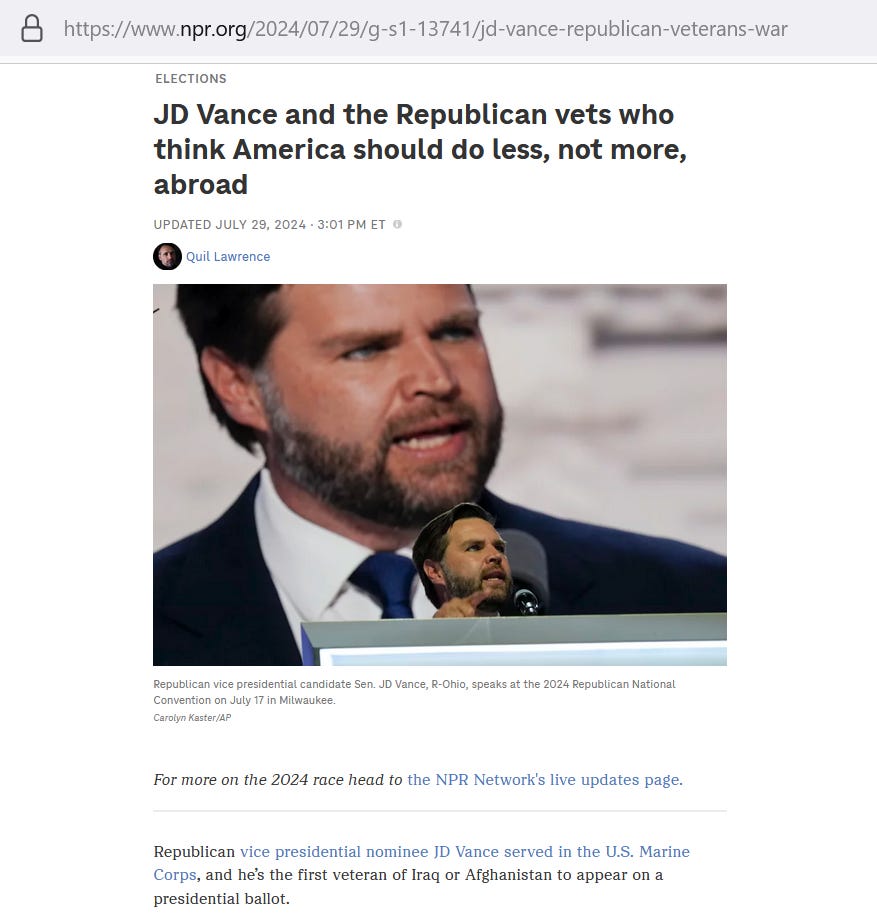
And here is the title and lead photo for NPR’s fact-based report on Kamala Harris:
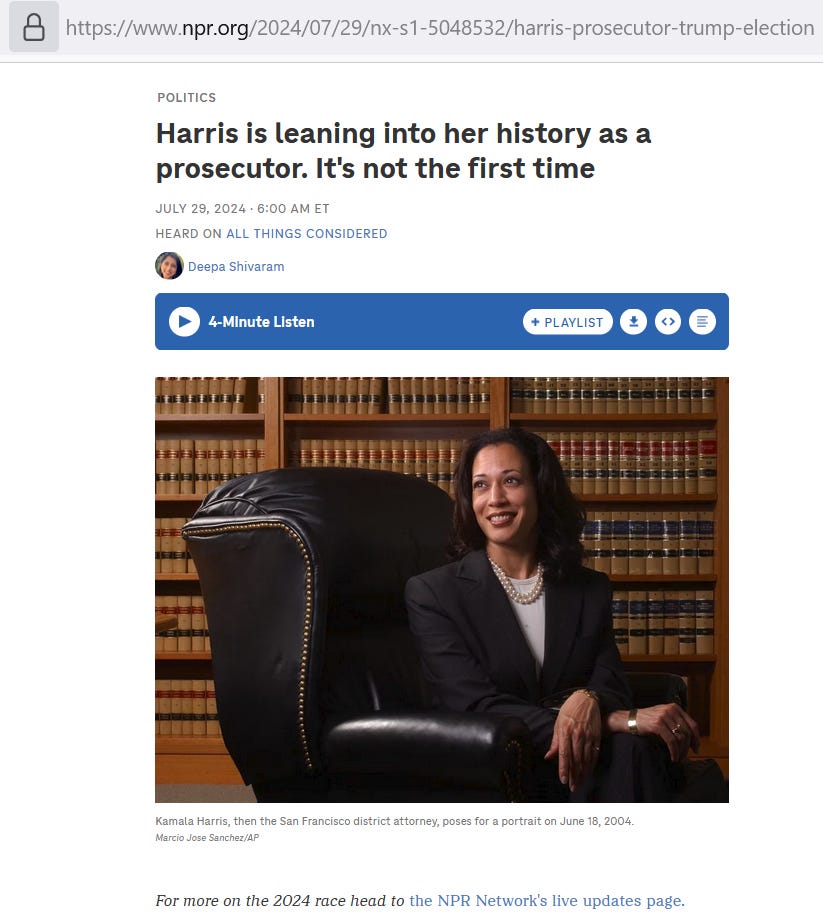
Notice anything about the two images? Right! Vance, the “first veteran of Iraq or Afghanistan to appear on a presidential ballot,” a politician who has been an outspoken (if limited) critic of U.S. militarism, is visually presented as a totalitarian dictator. He is scary. His small head and pointed finger get dwarfed by the same head projected on a yuge screen.
The authoritarian imagery used by NPR’s fact-based editors is anything but subtle. Here is a stock image of a dictator from istockphoto.com. Note the caption to the generic image, which, unlike the Vance image, at least includes a dictator who lightly smiles. It reads, “A man looking at the crowd from above, a symbol of totalitarianism, dictatorship, Machiavellianism. A symbol of an authoritarian regime.”

The totalitarian image of Vance, in fact, will be the only one to appear of the candidate in the (fact-based) NPR article that introduced readers to the Vice Presidential candidate’s arguably peacable focus on reining in American militarism, a view which NPR reports grew from Vance’s years of service in the military.
In contrast to the lone authoritarian snapshot of Vance, the NPR report dedicated to introducing readers to “new” Democrat presidential candidate Kamala Harris employs three images of the candidate. As with the Vance report, all of the images are (so far as I know) entirely fact based. They are real.
But they are certainly shaped. Unlike the military vet calling for less war while campaigning for Vice President, Harris does not get the totalitarian treatment. In fact, the opening image portrays her in a staged setting: sitting, smiling, set amidst a library of books—and twenty years younger!
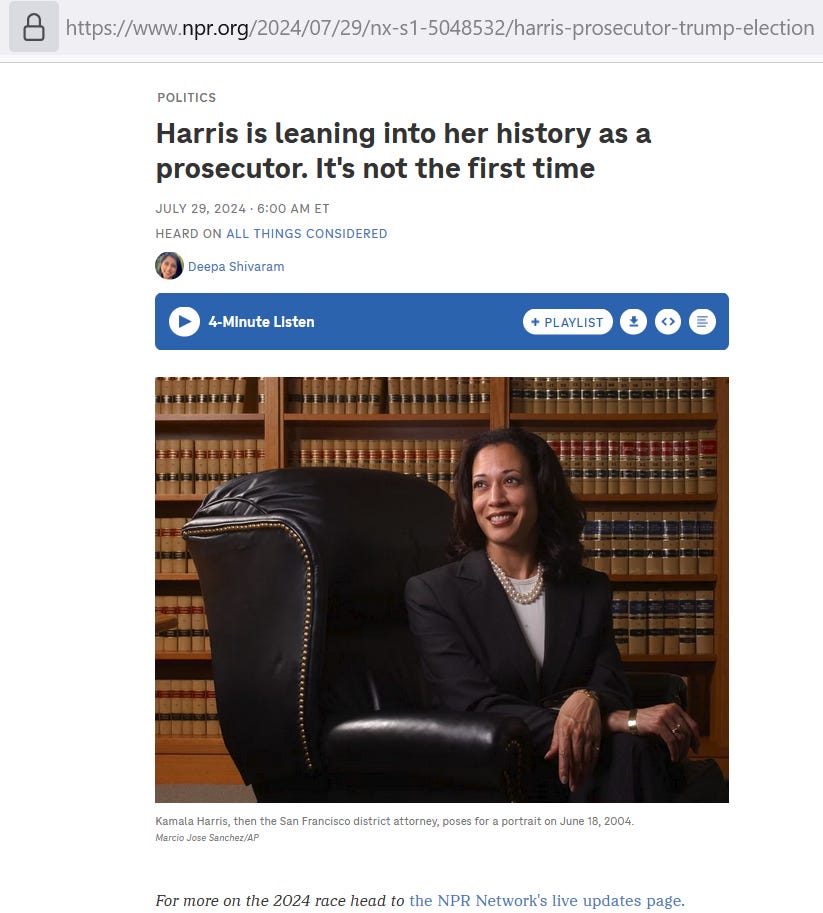
This last detail is of no small import. Over the previous year, the news cycle has honed in on the political problem to Our Democracy of gerentocratic lawmakers (as opposed to, say, the problem of America’s global war-mongering). Harris’s current boss, President Joe Biden, has been the poster-fogey for this national mania. Biden’s age—in reality, his mental free-fall that fact-based NPR news failed to corroborate until the actor George Clooney and a few other connected Democrats decided it was OK to acknowledge—directly led to the un-democratic coronation of Harris as the Democrat candidate for President.
(Apparently, Biden’s cognitive decline was fake news when observed and stated by former US President Donald Trump—but factual when reported by One Fine Day actor George Clooney.)
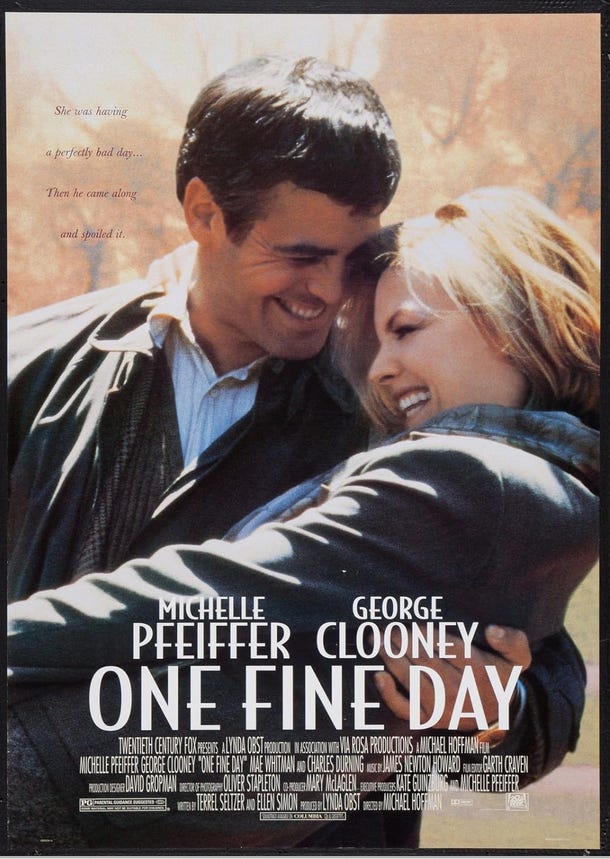
In leading with a real-life photo of a 39-year old smiling Kamala Harris, NPR had to have known that it was composing a dubious image of the 59-year old candidate. In a race that NPR and other news outlets have deemed a referendum on the olds, the lead photo disingenuously undercut a base biological strength of the 40-year old Vance, who whether you like him or not, is in fact 20 years younger than any of the other 3 Presidential/Vice Presidential candidates.
But NPR didn’t stop there. In fact, the article is visually organized to gently move the reader from sexy young Kamala to presidential-timbre Kamala.
Kamala image # 2 is Harris at age 49 (leading a money laundering investigation):
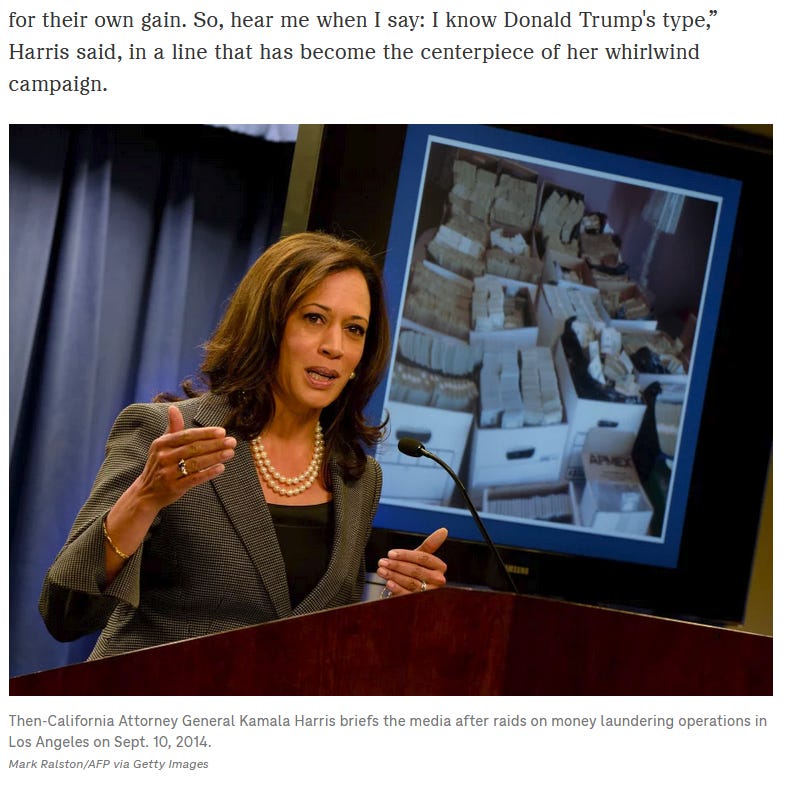
Then fact-based NPR image #3 eases the reader closer to present-day Harris. It shows Kamala in 2022 (now mourning with police officers), at age 58.
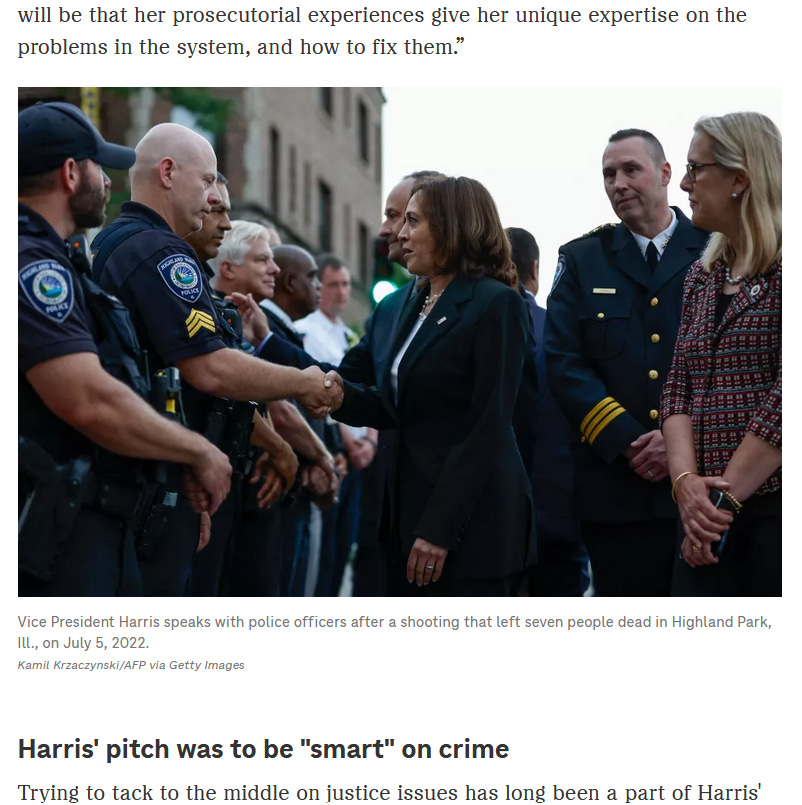
NPR pairs these respective images with fact-based text that shape the two new candidates in subjectively different ways.
In reality, Harris’s 2020 campaign for U.S. President was over nearly before it began, in large measure over the voting public’s dislike of her shape-shifting views on law and order. Despite a significant early media effort to push her as a Democrat frontrunner, Harris dropped out early in the race after sinking poll numbers and a growing realization that she was not even competitive in the primary in her home state of California.
The line that seemingly terminated her 2020 candidacy was delivered by then-candidate Tulsi Gabbard during the second primary debate. Gabbard said of Harris’s time as Attorney General of California that she “put over fifteen hundred people in jail for marijuana violations and then laughed about it when she was asked if she ever smoked marijuana.” (Yes, Harris has toked; Gabbard, like Vance a somewhat anti-war military veteran who still serves, was recently put on a Stasi-like air-surveillance list designed to follow “domestic terrorists.” Gabbard was placed on this list on the day Harris secured the 2024 Democrat nomination for President by a first-time-ever, pre-convention online vote of unelected delegates.)
In the 2024 NPR article re-introducing the “litigator” candidate, this history is entirely presented through what I assume are factual quotes provided by surrogate supporters of the candidate, all of whom opine on the world catching up to Harris’s prosecutorial views. In what is a surprise to this journalist who lives in a rabid blue university town, NPR relies on Harris surrogates to suggest that progressive Democrats have just now awoken to the need for a “litigator-in-chief,” ostensibly in order to prosecute Republican candidate Donald Trump. This fact-based reporting even appears in the article’s lede:
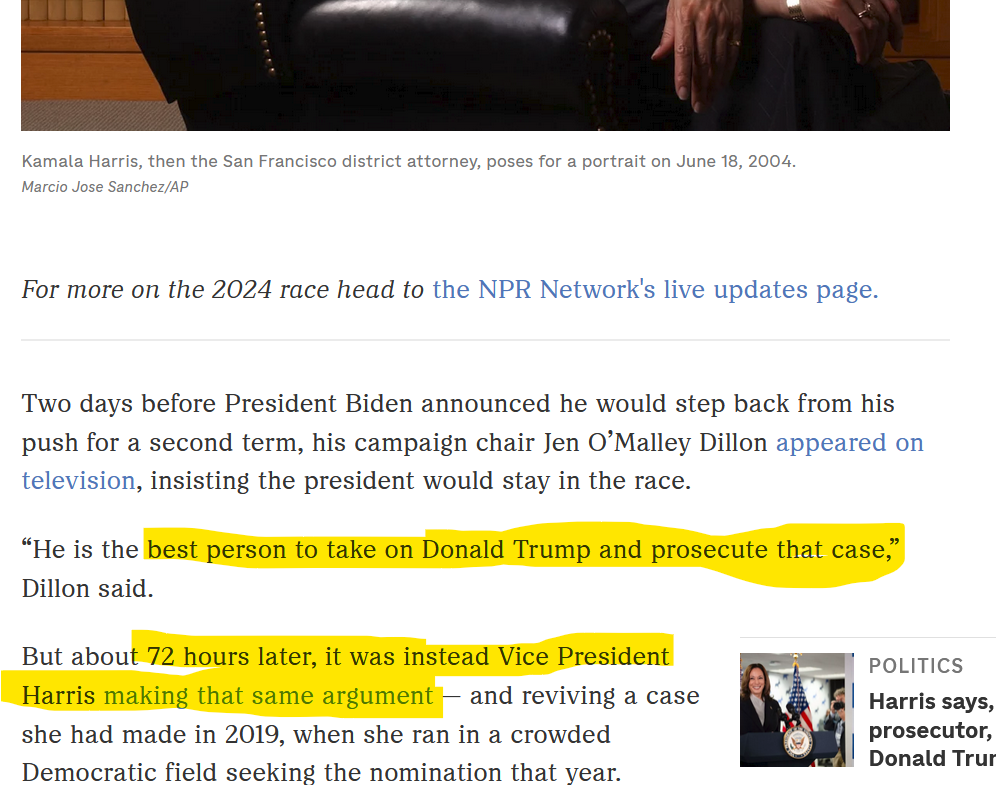
What qualifications would suggest Harris to a nation in the four years after she might presumably dispatch candidate Trump? Is her campaign pitch really that, as President, she could continue to lead court-cases against the Orange Man for the next 4-8 years? Is that of vital importance? Has she successfully turned Democrats into the party of school truancy-litigators in the same way Vance-the-totalitarian turned some Republicans onto an anti-war vibe? NPR has no facts for that sort of reporting, and it provides no counter-vailing views to inform its news consumers on why it matters that Harris can prosecute the hell out of Trump. Instead, the news outlet just adds another photo to the out-of-era Harris images, this one a reminding picture of the Orange One in court. Is that really a serious campaign platform? Factually?
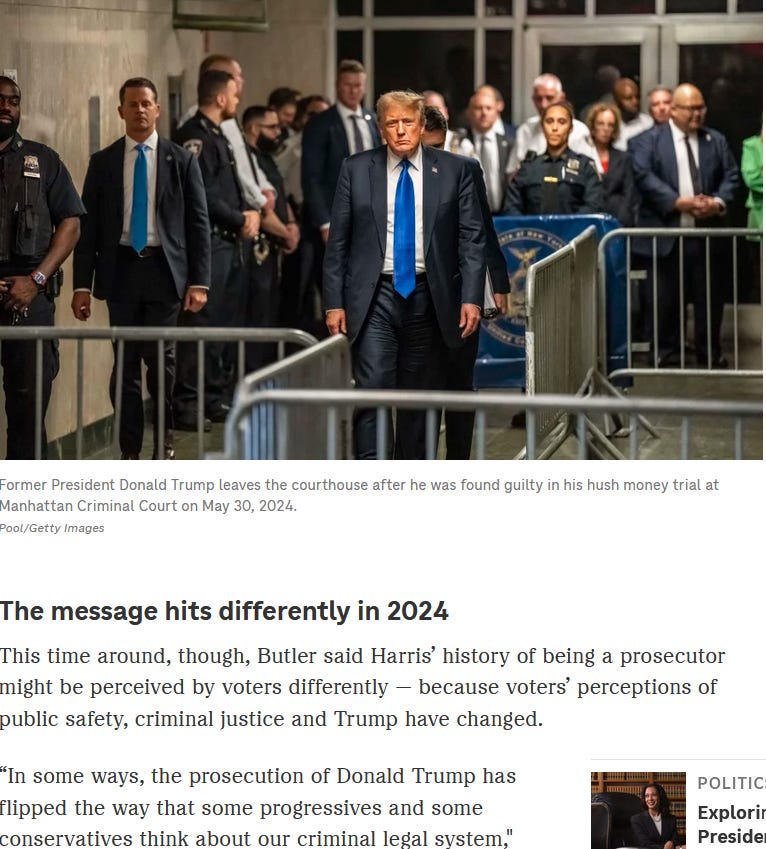
Vance, meanwhile, receives a different NPR shaping of facts. True, he is the first Iraq/Afghanistan vet to be part of a Presidential race. True, he now leads, as the NPR article factually observes, “a contingent of war veterans in the Republican Party who oppose U.S. military intervention abroad.” All noted.
But to counterbalance those facts, NPR composes a second set of fact-based quotes that are strikingly absent in the Harris reporting. The entire second-half of the article that introduces us to JD Vance is devoted to the countervailing view, the pro-war view. Just in case you may have missed it, NPR helpfully bolds the section of facts for you, you dumbass reader:
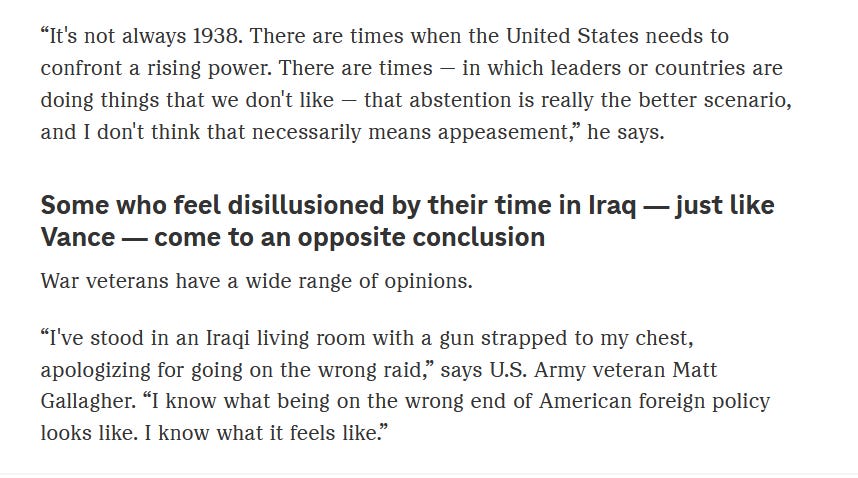
The “war veterans have a wide range of opinions” on the Ukraine War angle is augmented in the Vance NPR article by the second (of two) images. No, it is not a second picture of J.D. Vance. It is instead a photo of Vance critic Matt Gallagher, also an Army veteran. In the image, Gallagher is shown humanely interacting with another vet, who is in uniform. Holy cow what a contrast to the chosen headline image of Vance-as-dictator.

Gallagher’s story forms the entirety of the ending of the Vance article. Well, nearly the entirety. The NPR reporter—factually, it should be noted—decided to end with a statement about Kamala Harris’s support for Ukraine funding.

This is not an argument to support one candidate or another—though I must confess, as a longtime committed peacenik who has long been told that Democrats are the party of Peace, I would like to hear more about Vance’s anti-imperial views and his new coalition of anti-war former vets who skew Republican. After all, Kentucky’s got a couple of electeds in this red coalition.
It is instead an argument to not take any media outlet at their word—most especially those that preen over pleonasms like “fact-based journalism.” Doing anything less can only lead to blind citizen support for the sort of incapacitated brain-mush leadership that we’ve been presented with to run this country for decades.
****
Value what you read? Support my independent work and help pay NoC‘s bills by becoming a free or paid subscriber at our sister publication Shatty Town!, located on Substack. You’ll receive pre-print versions of North of Center articles sent directly to your email inbox.


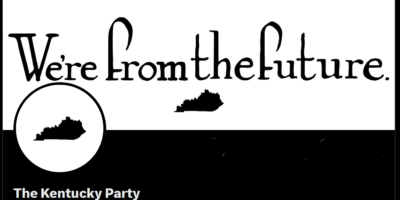
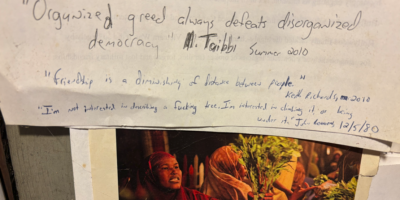

Leave a Reply